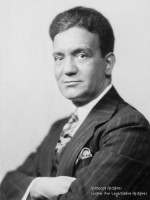
The economy was tanking. Millions lost their jobs. Stocks were down. And since bankers seemed to be riding out the bad times better than anyone, the government appointed a commission to look into who was to blame for the crash. But this was 1933, and Ferdinand Pecora was chief counsel to the U.S. Senate’s Committee on Banking and Currency.
Assigned to probe the causes of the 1929 crash, he led what became known as the “Pecora commission,” making front-page news when he called Charles Mitchell, the head of the largest bank in America, National City Bank (now Citibank), as his first witness. “Sunshine Charley” strode into the hearings with a good deal of contempt for both Pecora and his commission. Though shareholders had taken staggering losses on bank stocks, Mitchell admitted that he and his top officers had set aside millions of dollars from the bank in interest-free loans to themselves. Mitchell also revealed that despite making more than $1 million in bonuses in 1929, he had paid no taxes due to losses incurred from the sale of diminished National City stock—to his wife. Pecora revealed that National City had hidden bad loans by packaging them into securities and pawning them off to unwitting investors. By the time Mitchell’s testimony made the newspapers, he had been disgraced, his career had been ruined, and he would soon be forced into a million-dollar settlement of civil charges of tax evasion. “Mitchell,” said Senator Carter Glass of Virginia, “more than any 50 men is responsible for this stock crash.”
That was just the beginning. The proceedings became a “circus” and a media sensation. Read about how Pecora unearthed the dirty secrets of the banking industry that led to the Great Depression at
Past Imperfect.
 The economy was tanking. Millions lost their jobs. Stocks were down. And since bankers seemed to be riding out the bad times better than anyone, the government appointed a commission to look into who was to blame for the crash. But this was 1933, and Ferdinand Pecora was chief counsel to the U.S. Senate’s Committee on Banking and Currency.
The economy was tanking. Millions lost their jobs. Stocks were down. And since bankers seemed to be riding out the bad times better than anyone, the government appointed a commission to look into who was to blame for the crash. But this was 1933, and Ferdinand Pecora was chief counsel to the U.S. Senate’s Committee on Banking and Currency.
No comments:
Post a Comment